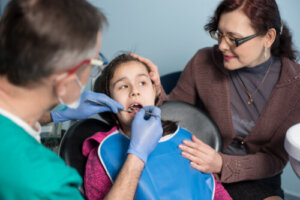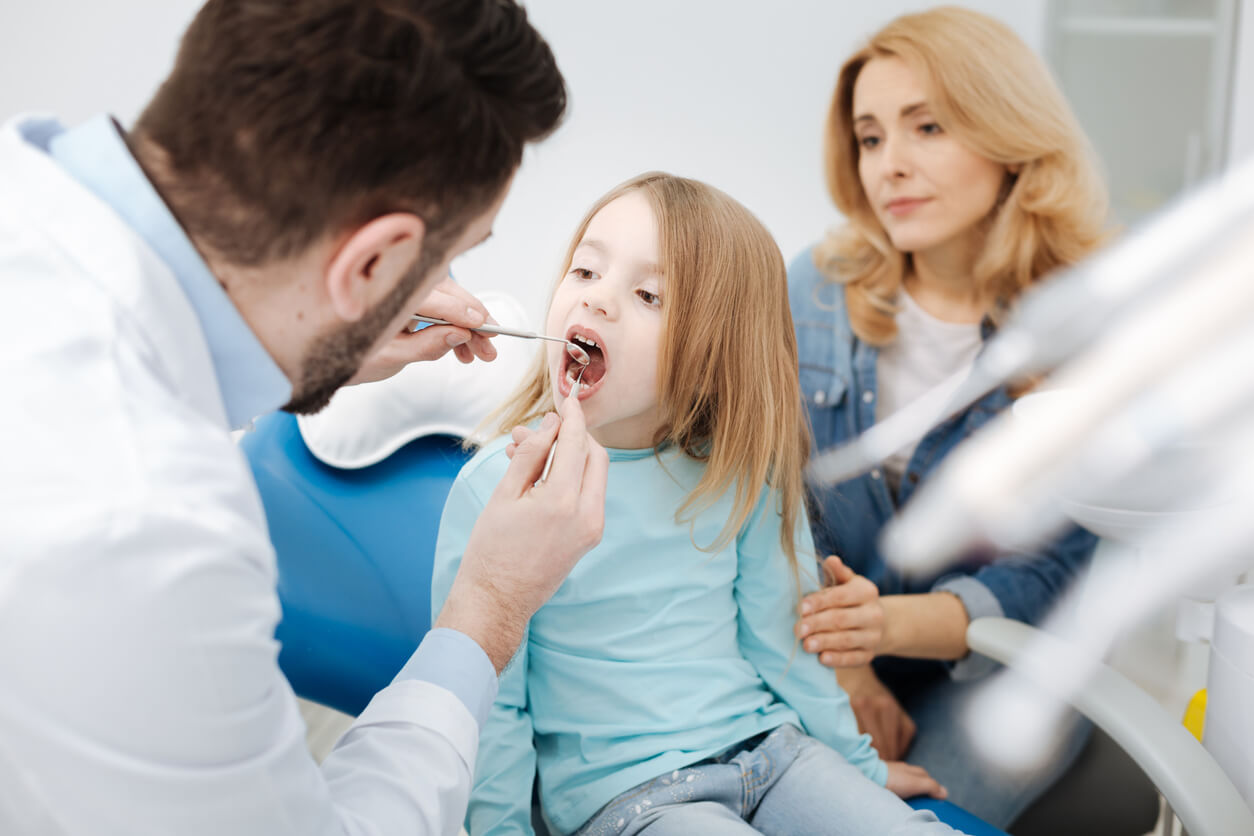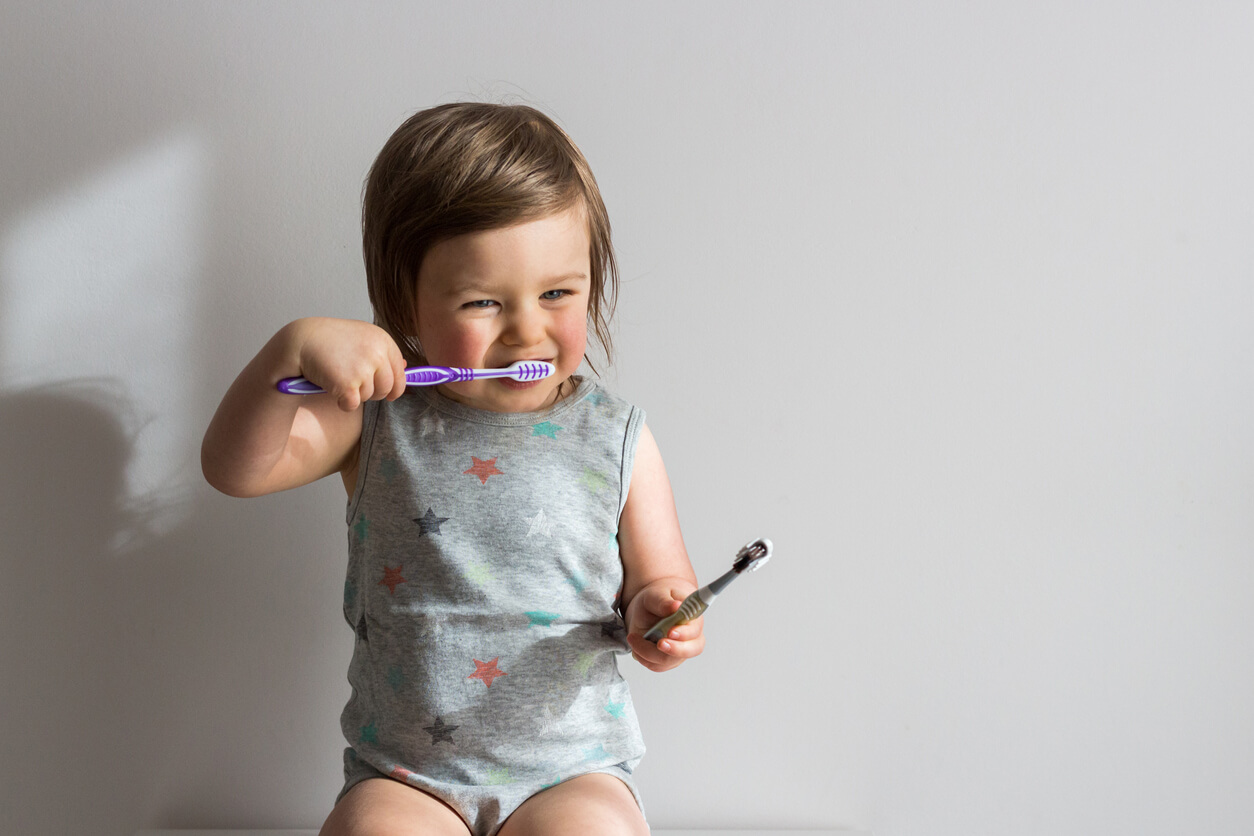5 Common Parental Mistakes that Can Lead to Tooth Decay in Children

When we have little ones, we only want their well-being and happiness. But if we talk about cavities, parents often make some mistakes that favor the development of tooth decay in their children.
In this article, we’ll tell you the 5 mistakes that adults often make and that favor the development of cavities. With this information, you’ll be able to avoid them and take care of the oral health of the youngest members of the household.
Know the most common mistakes made by parents that can cause tooth decay in their children
Sometimes, adults don’t have enough information to take proper care of their children’s mouths. Other times, they’re not aware of the damage that some of their decisions can cause to the small teeth. Here are the 5 most common mistakes so that you can avoid them.
1. Delaying the first visit to the pediatric dentist
Some adults wait until their little ones feel pain or have a problem with their teeth before going to the pediatric dentist. Others believe that checkups should begin when the permanent teeth appear.
However, not visiting the dentist at an early age is one of the mistakes parents can make that could lead to tooth decay in their children. The first visit should be made before the child is one year old, when the baby teeth appear in the mouth. After that, it’s best to visit the professional every 6 months for the following reasons:
- It allows to control the correct development and growth of the jaws and the eruption of the teeth.
- It helps to detect any problems early and apply preventive measures. Treatments will be easier and less invasive if approached from the beginning.
- Facilitates the child’s relationship with the professional. Generating a bond of affection and trust makes consultations more pleasant for everyone.
- The professional educates and teaches parents about everything that has to do with the care of their children’s mouths.

2. Not giving importance to baby teeth
Believing that baby teeth don’t need attention is another mistake parents make that could cause cavities in these teeth. It’s true that this dentition only lasts for a while in the mouth of the little ones and then falls out. But this doesn’t mean that they have no purpose in the mouth and don’t require care. Baby teeth allow the child to chew, speak, and smile normally.
In addition, they favor the correct growth of the jaws and the development of the shape of the face, while they keep space and guide the eruption of the permanent teeth. If the temporary teeth are not cared for, they can get caries or other infections. These problems not only affect the child’s quality of life, but also have repercussions on the permanent teeth that are forming.
How to take care of baby teeth
Baby teeth are cared for with proper oral hygiene every day and a healthy diet. In addition, frequent visits to the pediatric dentist should be made. If the milk teeth are already diseased, as well as the permanent teeth, they should be restored. Visiting the dentist to eliminate the condition and repair broken teeth is crucial to maintain the tooth until it falls out on its own.
Broken or prematurely erupted baby teeth can lead to bite problems in the future and the need for orthodontics. Therefore, taking care of these small temporary teeth avoids inconveniences now and in the future.
3. Giving children very sweet foods and drinks
The sugar we ingest is used by bacteria in the mouth to grow and multiply. In their metabolism, acids are produced which, when they come into contact with the hard tissues of the teeth, destroy them and cause tooth decay. Giving children too much sugar is another parental mistake that can cause cavities in children. Some of the products that contain it in large quantities are sweets, candies, sweets, pastries, and soft drinks, so it’s best to avoid them.
The use of the bottle at night to put the child to sleep is another factor to consider. The contact of milk sugar with tooth surfaces for long periods of time favors the development of early childhood cavities. In addition, placing sweetened substances inside the bottle or wetting the pacifier nipple with them also predisposes little ones to suffer from this disease.

4. Letting children brush on their own
Young children don’t have the ability to clean their mouths properly on their own. Lack of motor skills, lack of coordination, and insufficient knowledge of technique lead them to leave several areas uncleaned. Adults should be in charge of oral hygiene for children until they can do it themselves, which occurs between 6 and 8 years of age. Then, they should supervise the process to help children clean all areas of the mouth. In addition, it’s important to clean the tongue and floss the teeth. Removing plaque from the tongue surface and the area between the teeth helps prevent cavities.
5. Using toothpastes without fluoride
One of the mistakes parents often make that can cause tooth decay in their children is fearing that the fluoride in toothpaste can harm them. You should know that if toothpaste is used properly, this element isn’t only not harmful, but helps prevent the disease.
Fluoride is a product of nature that strengthens tooth enamel and makes it more resistant to bacterial acids. In addition, it helps to reduce the metabolism and proliferation of bacteria that cause cavities. At the same time, parents should be careful to apply the correct amount of fluoride toothpaste according to the age of the child to avoid excessive consumption of the mineral. Click on this link, where we’ll tell you how much toothpaste you should use.
Parents should set an example
There are several mistakes that can lead parents to increase the risk of cavities in their children. Most of the time, it’s due to a lack of information or to certain mistaken beliefs. But there’s something else that can favor the appearance of the disease in children, and that’s the lack of oral care in adults.
The example of parents is a great stimulus when it comes to instilling healthy habits in children. Taking care of your own hygiene, eating healthy, and visiting your dentist regularly is a great way to motivate your children to do the same. If children see that their parents don’t pay enough attention to their oral health care, they’ll hardly consider it important to take care of their own mouths.
When we have little ones, we only want their well-being and happiness. But if we talk about cavities, parents often make some mistakes that favor the development of tooth decay in their children.
In this article, we’ll tell you the 5 mistakes that adults often make and that favor the development of cavities. With this information, you’ll be able to avoid them and take care of the oral health of the youngest members of the household.
Know the most common mistakes made by parents that can cause tooth decay in their children
Sometimes, adults don’t have enough information to take proper care of their children’s mouths. Other times, they’re not aware of the damage that some of their decisions can cause to the small teeth. Here are the 5 most common mistakes so that you can avoid them.
1. Delaying the first visit to the pediatric dentist
Some adults wait until their little ones feel pain or have a problem with their teeth before going to the pediatric dentist. Others believe that checkups should begin when the permanent teeth appear.
However, not visiting the dentist at an early age is one of the mistakes parents can make that could lead to tooth decay in their children. The first visit should be made before the child is one year old, when the baby teeth appear in the mouth. After that, it’s best to visit the professional every 6 months for the following reasons:
- It allows to control the correct development and growth of the jaws and the eruption of the teeth.
- It helps to detect any problems early and apply preventive measures. Treatments will be easier and less invasive if approached from the beginning.
- Facilitates the child’s relationship with the professional. Generating a bond of affection and trust makes consultations more pleasant for everyone.
- The professional educates and teaches parents about everything that has to do with the care of their children’s mouths.

2. Not giving importance to baby teeth
Believing that baby teeth don’t need attention is another mistake parents make that could cause cavities in these teeth. It’s true that this dentition only lasts for a while in the mouth of the little ones and then falls out. But this doesn’t mean that they have no purpose in the mouth and don’t require care. Baby teeth allow the child to chew, speak, and smile normally.
In addition, they favor the correct growth of the jaws and the development of the shape of the face, while they keep space and guide the eruption of the permanent teeth. If the temporary teeth are not cared for, they can get caries or other infections. These problems not only affect the child’s quality of life, but also have repercussions on the permanent teeth that are forming.
How to take care of baby teeth
Baby teeth are cared for with proper oral hygiene every day and a healthy diet. In addition, frequent visits to the pediatric dentist should be made. If the milk teeth are already diseased, as well as the permanent teeth, they should be restored. Visiting the dentist to eliminate the condition and repair broken teeth is crucial to maintain the tooth until it falls out on its own.
Broken or prematurely erupted baby teeth can lead to bite problems in the future and the need for orthodontics. Therefore, taking care of these small temporary teeth avoids inconveniences now and in the future.
3. Giving children very sweet foods and drinks
The sugar we ingest is used by bacteria in the mouth to grow and multiply. In their metabolism, acids are produced which, when they come into contact with the hard tissues of the teeth, destroy them and cause tooth decay. Giving children too much sugar is another parental mistake that can cause cavities in children. Some of the products that contain it in large quantities are sweets, candies, sweets, pastries, and soft drinks, so it’s best to avoid them.
The use of the bottle at night to put the child to sleep is another factor to consider. The contact of milk sugar with tooth surfaces for long periods of time favors the development of early childhood cavities. In addition, placing sweetened substances inside the bottle or wetting the pacifier nipple with them also predisposes little ones to suffer from this disease.

4. Letting children brush on their own
Young children don’t have the ability to clean their mouths properly on their own. Lack of motor skills, lack of coordination, and insufficient knowledge of technique lead them to leave several areas uncleaned. Adults should be in charge of oral hygiene for children until they can do it themselves, which occurs between 6 and 8 years of age. Then, they should supervise the process to help children clean all areas of the mouth. In addition, it’s important to clean the tongue and floss the teeth. Removing plaque from the tongue surface and the area between the teeth helps prevent cavities.
5. Using toothpastes without fluoride
One of the mistakes parents often make that can cause tooth decay in their children is fearing that the fluoride in toothpaste can harm them. You should know that if toothpaste is used properly, this element isn’t only not harmful, but helps prevent the disease.
Fluoride is a product of nature that strengthens tooth enamel and makes it more resistant to bacterial acids. In addition, it helps to reduce the metabolism and proliferation of bacteria that cause cavities. At the same time, parents should be careful to apply the correct amount of fluoride toothpaste according to the age of the child to avoid excessive consumption of the mineral. Click on this link, where we’ll tell you how much toothpaste you should use.
Parents should set an example
There are several mistakes that can lead parents to increase the risk of cavities in their children. Most of the time, it’s due to a lack of information or to certain mistaken beliefs. But there’s something else that can favor the appearance of the disease in children, and that’s the lack of oral care in adults.
The example of parents is a great stimulus when it comes to instilling healthy habits in children. Taking care of your own hygiene, eating healthy, and visiting your dentist regularly is a great way to motivate your children to do the same. If children see that their parents don’t pay enough attention to their oral health care, they’ll hardly consider it important to take care of their own mouths.
All cited sources were thoroughly reviewed by our team to ensure their quality, reliability, currency, and validity. The bibliography of this article was considered reliable and of academic or scientific accuracy.
- Cárdenas, S. D. LA SALUD BUCAL DEL BEBÉ EMPIEZA DESDE EL EMBARAZO. Facultad de Enfermería Programa de Enfermería Universidad de Cartagena, 12.
- Sánchez García, M. N. (2021). SALUD BUCAL Y ENFOQUE DE LA ATENCIÓN ODONTOLÓGICA EN BEBES.
- Espinoza Plúas, T. S. (2021). Diagnóstico pronóstico y prevención de caries de la infancia (Bachelor’s thesis).
- Minaya, M. D. C. P. (2018). La Importancia de curar los Dientes de Leche. Evidencias en Odontología Clínica, 3(2), 6-7.
- Vitoria Miñana, I. (2002). Flúor y prevención de la caries en la infancia. Actualización 2002. Revista Pediatría de Atención Primaria, 4(15), 463-494.
- Miñana, V. (2012). El flúor oral para la prevención de caries,¿ cómo, cuándo ya quién?. Form Act Pediatr Aten Prim, 5(2), 108-13.
- Bergara Chapilliquien, E. P. (2020). Dieta y caries dental (Bachelor’s thesis, Universidad de Guayaquil. Facultad Piloto de Odontología).
- Robalino-Tello, A. B., Collantes-Acuña, J. E., & Flores-Jara, M. G. (2021). Caries dental en la primera infancia asociada a alimentos cariogénicos: una revisión de literatura. Maestro y Sociedad, 177-187.
- Páez, C. A. V., Castillo, E. L. T., & Ávila, J. A. T. (2021). Higiene bucal como factor determinante en incidencia de caries dental niños de 6 a 12 años. ReciMundo, 5(1), 227-240.
- Zanini, M., Tenenbaum, A., & Azogui-Lévy, S. (2022). La caries dental, un problema de salud pública. EMC-Tratado de Medicina.
This text is provided for informational purposes only and does not replace consultation with a professional. If in doubt, consult your specialist.








